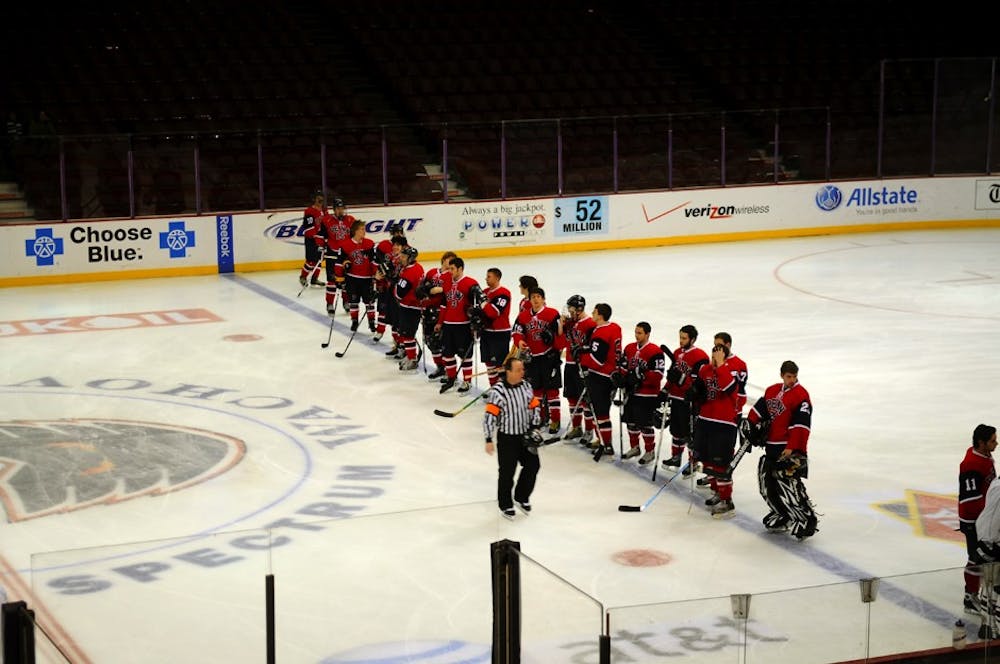
For many of our Ivy League comrades, the term “March Madness” calls to mind a tournament that is played not on the hardwood, but on the ice.
In nine of the last 10 years, at least one Ivy League team has participated in the NCAA Division I Men’s Ice Hockey Tournament, which contains a field of only 16 teams — and unlike in its basketball counterpart, each team has a realistic shot of being crowned national champion.
It begs the question, though: How do Ivy League schools manage to consistently achieve such success at the national level in ice hockey?
This season Yale entered the tournament favored to win it all, but the Bulldogs were upset in the regional finals — one game shy of reaching the “Frozen Four.”
In sports such as basketball and football, Ancient Eight teams finish light-years away from winning the national championship. The last Ivy to make the Final Four in basketball was Penn in 1979.
But hockey is a different story. Cornell reached the Frozen Four in 2003, and an Ivy claimed a national title in 1989 when Harvard won it all.
According to Brian Austin, executive associate athletic director at Dartmouth, tradition has a lot to do with the League’s strong NCAA hockey presence.
“[Ivy League] schools have a long tradition of success in ice hockey,” Austin said. “When you have a sport that has won national championships, it kind of builds on itself.”
Yet something else must explain how Ivy schools recruit the top talents in the country without offering scholarships.
Thomas Beckett, athletic director at Yale, believes Ancient Eight schools offer a unique opportunity most other schools cannot.
“The combination of receiving an outstanding education as well as playing the sport you are passionate about is very compelling,” he said.
But why hockey?
Austin offered another potential reason: unlike in other sports, Ivy League hockey graduates have often moved on to play at a professional level. Dartmouth alone currently boasts four alumni playing in the National Hockey League.
“The recent success we’ve had with our grads playing in the NHL certainly helps with recruiting,” Austin explained. “You can come to a great school, get a great education, and if you’re a great hockey player, you can play in the NHL.”
But unfortunately, unlike most of the Ancient Eight, students at Penn are unable to experience the excitement of a varsity hockey team. Penn and Columbia are the only two Ivy League schools lacking a varsity program — but for Penn, it wasn’t always that way.
* * *
Penn first recognized ice hockey as a varsity sport in 1965 and just two years later joined its fellow Ivy League schools in the Eastern College Athletic Conference.
After some rocky beginnings, the Quakers first reached the ECAC playoffs in 1971. The program reached its peak when it finished fourth in both 1972 and 1973.
Following a few seasons near the bottom of the conference, the University cut funding and stripped hockey of its varsity status in 1978. Since then, hockey has operated as a club sport.
If Penn were to bring varsity hockey back one day, could the sport be as successful as it was at fellow Ivy League schools?
“If any institution is willing to commit the resources, there isn’t any reason they couldn’t be successful,” Austin claimed.
It would certainly take significant resources that the University is currently unwilling to dedicate to hockey. But a varsity Penn team would experience the same benefits as its Ivy peers.
Alex Berman, a junior on Penn’s club team, believes reviving the hockey program makes sense, as a revamped Class of 1923 Arena would “fall in line with the school’s eastward expansion” plans.
“The rink could be transformed from a sight for sore eyes into a hub of student life on the eastern edge of campus,” he wrote in an email.
Berman lamented that, although he loves Penn, the one thing he doesn’t love is the “lack of school spirit.”
“We don’t all wake up on a Saturday morning at 10 a.m. to ‘get ready’ for a big football game featured on ESPN,” he wrote.
Despite back-to-back Ivy League championships, students find it difficult to get excited about a team without the possibility of playoffs.
“Student bodies, no matter how academically focused, love to support a team that is not only competitive and successful, but one which has the opportunity to move beyond the regular season and show its stuff on a national level,” Berman wrote.
Penn prides itself on the opportunities it offers its diverse collection of students. Yet by not fielding a varsity hockey team, it is both depriving its students of the excitement a hockey team can bring, and depriving itself of a potential pool of applicants who are remarkable student-athletes.
Mike Wisniewski is a sophomore architecture major from Philadelphia. He can contacted at dpsports@theDP.com.
The Daily Pennsylvanian is an independent, student-run newspaper. Please consider making a donation to support the coverage that shapes the University. Your generosity ensures a future of strong journalism at Penn.
DonatePlease note All comments are eligible for publication in The Daily Pennsylvanian.





